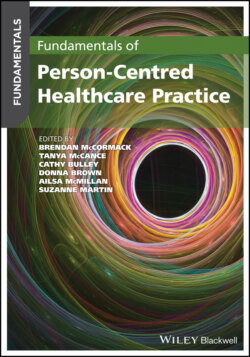Читать книгу Fundamentals of Person-Centred Healthcare Practice - Группа авторов - Страница 109
Creating person‐centred cultures
ОглавлениеThe Person‐centred Practice Framework provides a useful lens for professionals to view, guide and enhance practice. In the previous sections, we discussed prerequisites such as professional competence and developed interpersonal skills. We have also highlighted some of the care processes essential for person‐centred practice, such as working with a person's beliefs and values and sharing decision making. The practice environment, such as a ward, community hub, care home or health centre, and the wider organisational structures and leadership that support these environments are also significant in enabling professionals to support human flourishing. In the next section we propose strategies to support professionals to challenge issues that are at odds with their person‐centred values and beliefs. These strategies include reflection, self‐care and constructive challenge.
Critical reflection is a useful tool for professional learning (Gardner 2014) and can help professionals to discuss, deconstruct and learn from clinical issues. Deep learning is enhanced by a supportive culture and skilled facilitation (Dewing 2008; Mann et al. 2009). Reflective learning can be viewed as occurring at micro, meso, and macro levels. In the above activity, at a micro level John and his supervisor may analyse his actions with Mr Gregor and explore why he felt unable to ask for help. These reflections could be recorded to support continuing professional development and lifelong learning. At the meso level, his supervisor may use this as an opportunity to reflect on expectations of students and the learning culture of the unit. At a macro level, audit results of the learning environment may reveal a high number of critical incidents focusing on safe moving and handling, suggesting that lessons can be learned from this reflection that lead to action at institutional level.
Reflection can also support the development of self‐knowledge and such insights might lead to the consideration of strategies to support a professional's own well‐being. Some aspects of professional practice, such as long working hours, stressful encounters and placing people's needs ahead of our own, are known to have a detrimental impact on well‐being (American Dental Association 2019; Winkel and Morgan 2019), and can result in moral distress and burnout (Hamric 2010). It is important for healthcare professionals to demonstrate self‐care and to build resilience to ensure that their fitness for professional practice is not compromised.
In the vignette above we highlighted that staff may experience moral distress regarding discussions about the safety and dignity of people being considered for discharge. Through reflection, practitioners may realise that this is embedded in practice. Challenging values and behaviours that appear to be prioritised within the organisation can create anxiety and contribute to diminished well‐being. Strategies that might support well‐being could include engaging in clinical supervision to discuss matters and explore how to act. Practice development initiatives, where participants are supported to role play a range of alternative actions in a safe space, may be another means of challenging negative cultures. Additionally, learning mindful practices may support well‐being and stress management and help achieve a work/life balance. This is discussed in greater detail in Chapter 15. By engaging in such activities, practitioners may feel empowered to constructively challenge the behaviours and values that were observed at the meeting or speak to another manager to report the concerns that were witnessed.
